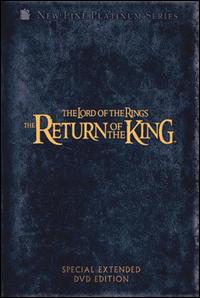 J.R.R. Tolkien had a lingering suspicion that The Lord of the Rings was fundamentally an un-filmable story; he expressed the opinion that it was peculiarly unsuitable to dramatization and found himself disappointed (and a bit bewildered) at several attempts that were made at radio and film versions of his work. A couple of days ago, L. and I received Peter Jackson’s extended edition DVD of The Return of the King in a package on our doorstep. Tolkien was certainly right to worry–just look at the god-awful mess Ralph Bakshi made in The Lord of the Rings Part One (or better yet, don’t). But Jackson’s recut film (which we watched, of course, the first night that we had it) is just the last of a series of reminders that what is long hoped for can be fulfilled against all odds, that magnificient things really are possible in film, and that there is real beauty in this world, that there are things worth caring and raving about not because of anything that they are good for, but just because of what they are.
J.R.R. Tolkien had a lingering suspicion that The Lord of the Rings was fundamentally an un-filmable story; he expressed the opinion that it was peculiarly unsuitable to dramatization and found himself disappointed (and a bit bewildered) at several attempts that were made at radio and film versions of his work. A couple of days ago, L. and I received Peter Jackson’s extended edition DVD of The Return of the King in a package on our doorstep. Tolkien was certainly right to worry–just look at the god-awful mess Ralph Bakshi made in The Lord of the Rings Part One (or better yet, don’t). But Jackson’s recut film (which we watched, of course, the first night that we had it) is just the last of a series of reminders that what is long hoped for can be fulfilled against all odds, that magnificient things really are possible in film, and that there is real beauty in this world, that there are things worth caring and raving about not because of anything that they are good for, but just because of what they are.
(Minor spoiler alert: don’t read the next four paragraphs if you don’t want to know what was added to the Extended Edition yet.)
The Extended Edition of ROTK is, much like the other two extended editions, a notably better version of a film that was already fantastic; whatever Jackson’s (misguided, I think) worries about the constraints on film being shown in a cinema, the DVD format gives him the leisure that he needs to draw out the tale and the characters as they deserve to be.
One of the chief beneficiaries is Denethor, whose increased screen time leaves him still noticeably more brutal and less fiercely-noble-but-despairing than you find him in the books, but who still has the time now to fully work out his pride, his heartrending grief, his despair, and his fall into madness. There is a moment, in both the cinematic release and in the Extended Edition, in which Faramir suggests that his father wishes that he had gone to Rivendell instead, and died in Boromir’s place–and Denethor clenches his jaw as he sips his wine, and quietly says that yes, he does wish that. I thought at the time that the scene was masterfully acted by John Noble, who showed both how brutal Denethor’s honesty was, but also how it cost him to say it at last; but when I saw Return of the King at the cinema, a lot of the audience just couldn’t seem to believe it. But the more chance we have to see Denethor, his despair in the war, and his mourning for Boromir, the more (I think) that moment resonates–to the point of being almost drawing tears. (As for Faramir’s suicidal charge on Osgiliath and Denethor’s descent into madness, there was no “almost” about it.)
The pacing of the Battle of Pelennor Fields is also less harshly abbreviated; the arrival of the Black Ships is still lamely anticlimactic, but Jackson does take the chance to draw out the siege of Minas Tirith in all its intolerable tension, to finally make some real reference to the day without dawn, and to place Gandalf in his confrontation with the Witch-King moments before the arrival of the Rohirrim at an unexpected sunrise. That moment, which had been little more than a transition to the next scene (albeit a fantastic next scene) in the cinematic version is now feels heighted to a genuine eucatastrophe in the depth of the darkest hour (just as Tolkien had intended it). Roger Ebert pointed out (in a review that I fear mostly missed the point) how Jackson has the will to show marvellous things on film and to use the entire screen doing it that has not really been seen since the great silent directors (Fritz Lang, in particular). What the extended editions of The Lord of the Rings have also shown is that he has the will–unlike almost any other filmmaker today–to take what he is doing absolutely seriously, and to slowly build (over the course of a good twelve hours or so of film!) to moments of real intensity, of terrible sadness and exuberant joy, without either smirking at the camera or indulging in Spielbergian sentimentality. Very few people working in film today, and almost certainly no-one who has worked on big-budget Hollywood productions in many a year, come anywhere near to making anything that is either so gloriously cinematic or so earnestly dramatic.
There are flaws of course–I might mention Jackson’s obsession with people falling unnecessarily from very high places, or the scriptwriters apparently complete misunderstanding of Valinor (all the evidence points to their having confused it with Heaven)–but these are rarely anything new and they don’t come anywhere near disrupting four hours of brilliant, emotionally exhausting, and simply beautiful film work. I don’t care what anyone says; the multiple endings
and their real sense for the joy, beauty, and sadness of Tolkien’s denouement are one of the best things about this film, and although I think that the extended Fellowship remains clearly Jackson’s best work, Return is as nearly perfect a climax and farewell to the journey as you could hope for.
If I’m indulging in a bit of stridor for Strider and the rest of the gang, forgive me. I don’t, really, know how to write criticism without either making snarky remarks about lame moments in a film or else coming off as a raving fanboy (which I do, sometimes, and which I certainly am, in some cases). But what I want to say is this: the films that Jackson has given us really are some of the great works of film in our time, and if we take film seriously as art–and if we take art, and beauty, seriously as part of the good life–then it should be a delight to see something so sincere and so genuinely good available to us. We live in a media rich age, and all too much of what that means is that a lot of crap is now easily available 24/7. But it does also mean that Peter Jackson was able to make something that is genuinely and unabashedly great and beautiful, and to do so with a remarkable amount of thought and sensitivity to the text that Tolkien wrote and the intent behind it. That’s something remarkable, and if we are going to talk about human life in civilization, the usual bullshit that we dish about and get bunched up over is really only the dark and empty shadow cast over what is really meaningful. If Tolkien has only one thing to say to us about our times and his, it’s this: it is the builders, not the
destroyers, who are worth remembering in history, and the reason that it’s sometimes worth the fight and struggle is the hope that it can free us–that we can live our lives together free to make things fit for everlasting memory, to seek, with wisdom and humility, the truth, and to behold, with love, the beauty that is in and the beauty that is beyond this world. Or, as Tolkien put it (in a scene that Jackson has delightfully restored to the Extended Edition):
Frodo sighed and was asleep almost before the words were spoken.
Sam struggled with his own weariness, and he took Frodo’s hand; and
there he sat silent till deep night fell. Then at last, to keep
himself awake, he crawled from the hiding-place and looked out. The
land seemed full of creaking and cracking and sly noises, but there
was no sound of voice or of foot. Far above the Ephel Dúath
in the West the night-sky was still dim and pale. There, peeping
among the cloud-wrack above a dark tor high up in the mountains,
Sam saw a white star twinkle for a while. The beauty of it smote
his heart, as he lookd up out of the forsaken land, and hope
returned to him. For like a shaft, clear and cold, the thought
pierced him that in the end the Shadow was only a small and passing
thing: there was light and high beauty for ever beyond its reach.
His song in the Tower had been defiance rather than hope; for then
he was thinking of himself. Now, for a moment, his own fate, and
even his master’s, ceased to trouble him. He crawled back into the
brambles and laid himself by Frodo’s side, and putting away all
fear he cast himself into a deep and untroubled sleep. (199)
Goodnight.
 J.R.R. Tolkien had a lingering suspicion that The Lord of the Rings was fundamentally an un-filmable story; he expressed the opinion that it was peculiarly unsuitable to dramatization and found himself disappointed (and a bit bewildered) at several attempts that were made at radio and film versions of his work. A couple of days ago, L. and I received Peter Jackson’s extended edition DVD of The Return of the King in a package on our doorstep. Tolkien was certainly right to worry–just look at
J.R.R. Tolkien had a lingering suspicion that The Lord of the Rings was fundamentally an un-filmable story; he expressed the opinion that it was peculiarly unsuitable to dramatization and found himself disappointed (and a bit bewildered) at several attempts that were made at radio and film versions of his work. A couple of days ago, L. and I received Peter Jackson’s extended edition DVD of The Return of the King in a package on our doorstep. Tolkien was certainly right to worry–just look at 
